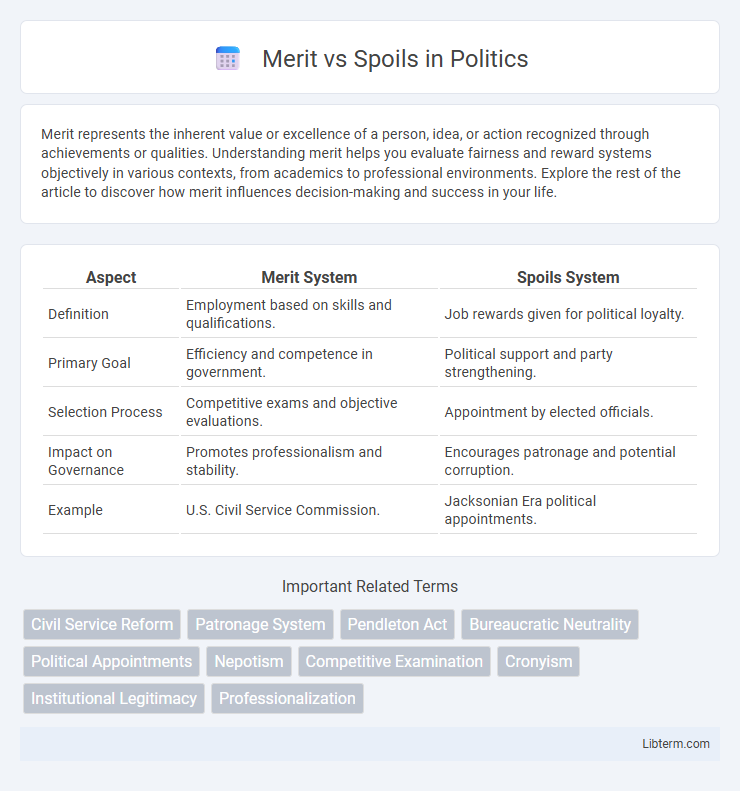Merit represents the inherent value or excellence of a person, idea, or action recognized through achievements or qualities. Understanding merit helps you evaluate fairness and reward systems objectively in various contexts, from academics to professional environments. Explore the rest of the article to discover how merit influences decision-making and success in your life.
Table of Comparison
| Aspect | Merit System | Spoils System |
|---|---|---|
| Definition | Employment based on skills and qualifications. | Job rewards given for political loyalty. |
| Primary Goal | Efficiency and competence in government. | Political support and party strengthening. |
| Selection Process | Competitive exams and objective evaluations. | Appointment by elected officials. |
| Impact on Governance | Promotes professionalism and stability. | Encourages patronage and potential corruption. |
| Example | U.S. Civil Service Commission. | Jacksonian Era political appointments. |
Understanding Merit-Based Systems
Merit-based systems prioritize skills, performance, and qualifications to allocate rewards and opportunities, ensuring fairness and motivation. Unlike spoils systems, which distribute benefits based on political connections, merit systems enhance organizational efficiency and public trust. Assessing merit involves standardized evaluations, transparent criteria, and continuous performance monitoring to maintain integrity and accountability.
What Is the Spoils System?
The spoils system is a practice in which political leaders reward loyal supporters with government jobs and favors after winning an election. This system prioritizes political loyalty over merit and competence, often leading to inefficiency and corruption in public administration. Unlike the merit system, which emphasizes qualifications and performance, the spoils system allows for widespread patronage and favoritism.
Historical Evolution: Merit vs. Spoils
The historical evolution of Merit vs. Spoils systems highlights a shift from patronage-based appointments to qualifications-based civil service. The Spoils System, dominant in 19th-century American politics, awarded government positions to loyal party supporters, often leading to corruption and inefficiency. The Pendleton Civil Service Reform Act of 1883 marked a critical turning point by establishing competitive exams to promote merit-based hiring, enhancing professionalism and accountability in public administration.
Key Differences Between Merit and Spoils
Merit refers to achievements or qualities earned through effort, skill, or hard work, while spoils are benefits or rewards gained often through conquest or exploitation. Key differences lie in the origin of the reward: merit is based on personal accomplishment, whereas spoils result from external acquisition, typically at another's expense. Merit promotes fairness and recognition, while spoils are associated with imbalance and appropriation.
Advantages of Merit-Based Approaches
Merit-based approaches promote fairness by rewarding individuals based on skills, qualifications, and performance, leading to higher productivity and motivation. These systems enhance organizational efficiency by matching roles with the most capable candidates, reducing bias and favoritism often seen in spoils-based practices. Emphasizing merit also fosters a culture of continuous improvement and innovation, driving long-term success and credibility.
Drawbacks of the Spoils System
The spoils system often leads to unqualified individuals occupying important government positions due to appointments based on political loyalty rather than merit, resulting in inefficiency and corruption. This favoritism undermines public trust and disrupts the continuity of competent administration. Moreover, the lack of standardized hiring processes discourages skilled professionals from pursuing public service careers.
Real-World Examples: Merit in Practice
Merit-based systems thrive in organizations like Google, where employee promotions and project leadership are awarded based on skills, innovation, and measurable contributions. Countries such as Singapore attribute their rapid economic development to meritocracy, implementing rigorous education and civil service exams that ensure competent governance. These real-world examples demonstrate how merit fosters productivity, fairness, and sustainable growth by prioritizing ability over favoritism.
Political Implications of Spoils Systems
The spoils system, characterized by awarding government positions based on political loyalty rather than merit, often results in inefficiency and corruption within public administration. This practice undermines the professionalization of civil services and can erode public trust in government institutions. Political patronage through the spoils system incentivizes short-term loyalty over long-term competency, destabilizing the effectiveness of governance.
Reforms Promoting Meritocracy
Reforms promoting meritocracy emphasize rewarding individuals based on talent, skills, and achievements rather than connections or favoritism, fostering efficiency and fairness in administrative systems. Policies such as competitive exams, transparent recruitment, and performance-based evaluations help reduce corruption and nepotism by prioritizing competence over spoils-based allocations. Implementing meritocratic reforms enhances public trust and drives sustainable development by ensuring the most qualified candidates occupy key leadership positions.
The Future of Merit vs. Spoils in Governance
The future of merit versus spoils in governance hinges on increasing demands for transparency, accountability, and efficiency in public administration. Merit-based systems drive these goals by ensuring that positions are awarded based on qualifications and performance, reducing corruption and fostering public trust. Evolving technologies and data analytics will further enable meritocratic approaches, diminishing the influence of patronage and promoting equitable governance outcomes.
Merit Infographic

 libterm.com
libterm.com